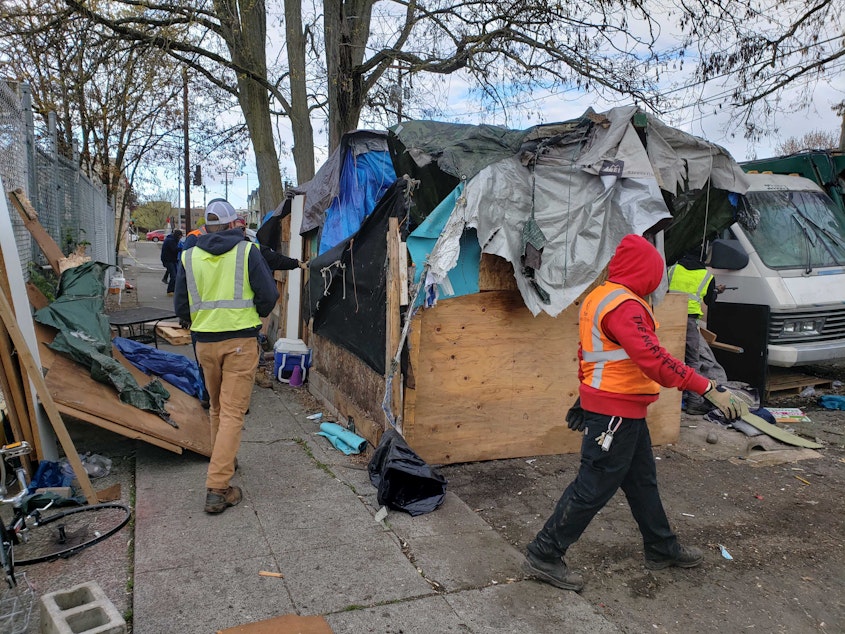An unhoused woman built herself a weatherproof shed. Seattle just knocked it down

The woman, named Melissa, moved to the industrial stretch of Seattle’s Ballard neighborhood three years ago.
Melissa and her partner pitched a tent at first, on this street lined by warehouses, and then built it into a wooden shed with a shingled roof and a porch. It was one of several makeshift structures along Northwest 54th Street.
On Friday morning, as Melissa chatted out front, she heard a loud crack. Someone from the Seattle Parks and Recreation department had brought a sledgehammer to the wall of her shed. This was an eviction, a sweep of an illegal homeless encampment. Melissa burst into tears. She pulled out her cats and some belongings.
Sweeps are on the rise in Seattle. Under Mayor Jenny Durkan, there was one a month, typically. Now there are one to three a week.
The practice of regular camp removals slowed during the pandemic, in part due to Centers for Disease Control guidance which warned that the practice could spread Covid-19. These restrictions have since eased.
Sponsored
Seattle’s new mayor, Bruce Harrell, also came into office at the start of the year. He emphasized public safety during his election campaign and promised to “get people out of parks and streets” and into housing with services.
There had been reports of violence and fires at some of these encampments, some of which stood adjacent to local businesses.
“Yesterday, I spotted a resident with a handgun,” a Georgetown business owner wrote to city employees and leaders last December. “They were taking it from one camper to the next in broad daylight.”
Police responded quickly, the business owner wrote, and recovered a BB gun.
“It completely messed [with] my psyche,” they said.
Sponsored
The city has recently shortened the amount of notice they give people living in tents. City employees used to post paper notices on tents about 72 hours in advance of a clearing. Other times, the unhoused got a week's notice. This has scaled down to two-days notice, and sometimes less.
During tent removals, up to 12 Seattle police officers have stood by in case of safety issues.
Earlier this month, Seattle Police spokesperson Randall Huserik said the police team that aids with encampment cleanups (and emphasis patrols) had increased in size. These officers were previously within the patrol unit, Huserik said by email.
At the same time, the Seattle Police Department faces a staffing shortage due to officers leaving.
The City of Seattle has often pointed out that their outreach partners visit encampments ahead of a clearing, and refer people to temporary shelter days before Parks and Recreation and the police arrive.
Sponsored
But offering shelter is not a one-size-fits-all solution. Relocating someone into a shelter can be difficult if it means the person will be separated from loved ones or pets. Sometimes the shelter is across town, making it inconvenient for someone who commutes to work.
Sometimes people living unsheltered simply pack up their tents and move to another public space, until Parks and Recreation and police show up again.
During a press conference last week, a person from the Seattle area told the mayor that while they appreciated the clearing of the homeless from weeks before, that people living unsheltered had returned to their neighborhood. They asked what could be done.
Harrell responded that the city isn’t trying to “strong arm” their way into public safety, but trying to “lead with compassion and love.”
Jonathan Choe, former KOMO News reporter, said homeowners in Capitol Hill were "thrilled" with the pace of tent removals and asked if it would continue.
Sponsored
"Everything that we're doing is designed to be sustainable,” Harrell said, before sharing a story with the crowd: Over the weekend, a woman approached him during an event, he said, and told him she was present during the Ballard encampment removal.
“She said she believed in me and our approach, but she thought that some of the workers could have been a little more gentle,” Harrell said. “I will take that to heart. And I will talk to our team about that. Because I truly believe that people want housing, they want help, and they want services."
As for Melissa, the Ballard woman, she and her two cats moved into a hotel paid for by volunteers with Transit Riders Union, a mutual aid group.



